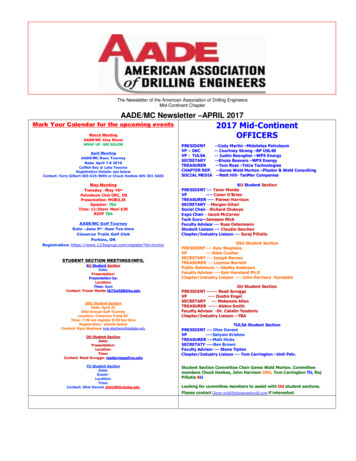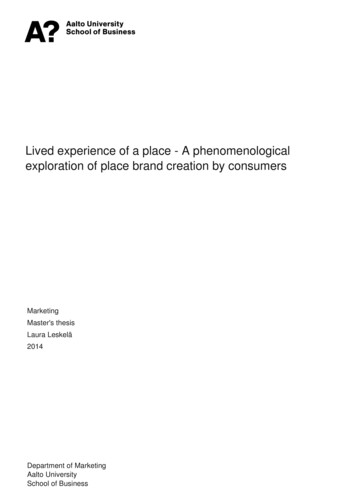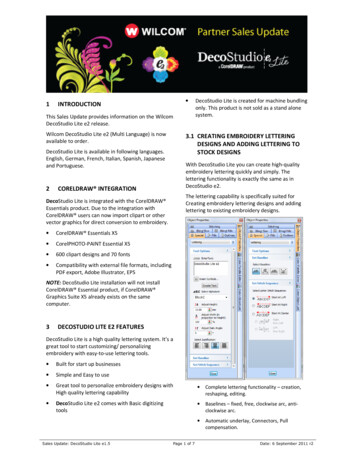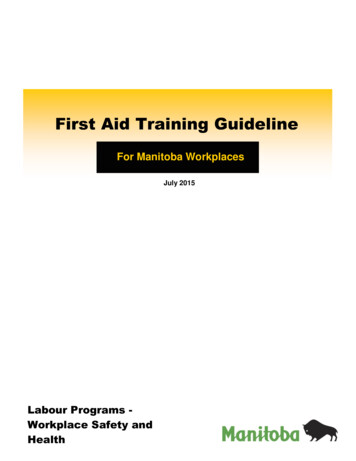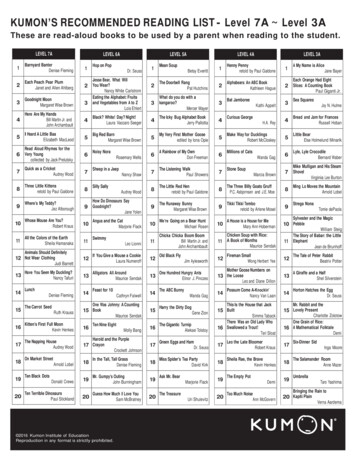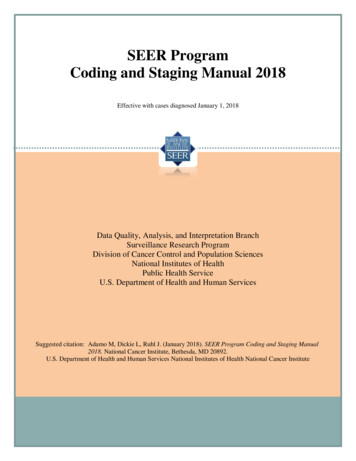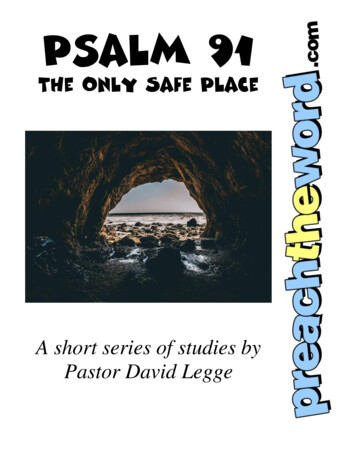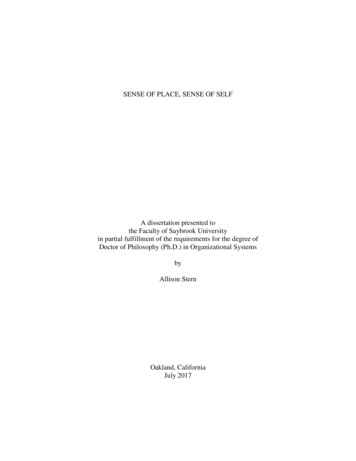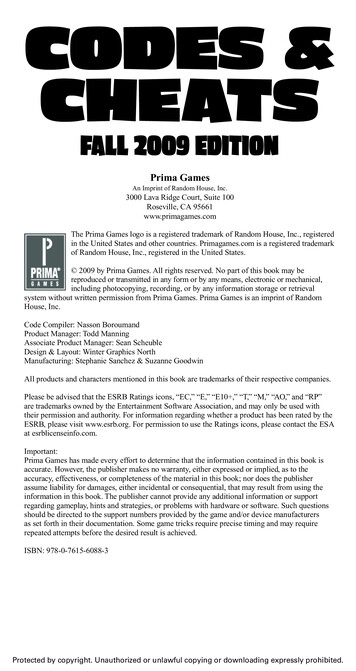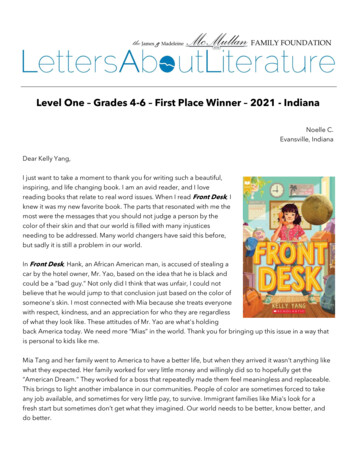
Transcription
Level One – Grades 4-6 – First Place Winner – 2021 - IndianaNoelle C.Evansville, IndianaDear Kelly Yang,I just want to take a moment to thank you for writing such a beautiful,inspiring, and life changing book. I am an avid reader, and I lovereading books that relate to real word issues. When I read Front Desk, Iknew it was my new favorite book. The parts that resonated with me themost were the messages that you should not judge a person by thecolor of their skin and that our world is filled with many injusticesneeding to be addressed. Many world changers have said this before,but sadly it is still a problem in our world.In Front Desk, Hank, an African American man, is accused of stealing acar by the hotel owner, Mr. Yao, based on the idea that he is black andcould be a ”bad guy.” Not only did I think that was unfair, I could notbelieve that he would jump to that conclusion just based on the color ofsomeone's skin. I most connected with Mia because she treats everyonewith respect, kindness, and an appreciation for who they are regardlessof what they look like. These attitudes of Mr. Yao are what's holdingback America today. We need more “Mias” in the world. Thank you for bringing up this issue in a way thatis personal to kids like me.Mia Tang and her family went to America to have a better life, but when they arrived it wasn’t anything likewhat they expected. Her family worked for very little money and willingly did so to hopefully get the“American Dream.” They worked for a boss that repeatedly made them feel meaningless and replaceable.This brings to light another imbalance in our communities. People of color are sometimes forced to takeany job available, and sometimes for very little pay, to survive. Immigrant families like Mia’s look for afresh start but sometimes don’t get what they imagined. Our world needs to be better, know better, anddo better.
As I mentioned before, this is my new favorite book. This book was unlike any other book that I’ve readbefore. All kids should read this book, and teachers should be grabbing it off their shelves to share withtheir students. The messages of equality, bullying, acceptance, and opportunity are really powerful andhave the ability to change the way people think about the world. This is what we need now. We are thefuture, and children need to hear your message, so they will make a world that is the “American Dream.”Thank you for changing my life and creating a better understanding of what’s happening in our worldtoday inside me.Sincerely,Noelle C.
Level Two – Grades 7-8 – First Place Winner – 2021 - IndianaMelani B.Jasper, IndianaDear Alan Gratz,I came to this country without anything, only looking for reassuranceand a purpose, and this book gave me exactly that. Hot. Sweaty.Disoriented. I was only five years old feeling all these emotions in acountry I was so foreign in. I didn’t know when to run or when to walk oreven when I was allowed to speak. This feeling, I thought, couldn’t havebeen described better than it was in the book Refugee by Alan Gratz.You made a character that was named Isabel and she was a Cuban girlwho was escaping from her mother country, Cuba, because of the riotsand communism.It was 2010 when my dad decided that we, as a family, could not live inCuba. Cuba, during that time, was full of madness. It’s a communisticcountry, of course. There was barely any food and people were mad atthe horrendous government they had. I, as a 4-year-old girl, had barelyany food and protein to keep me healthy. The mosquitoes of theCaribbean ate me up and I was ill frequently. We had to flee. My dadhad decided to come first and then we, my mother and I, would come around a year later. We decided onthis because it was better for me and my mom to come to America with my dad already knowing theenvironment there and having a stable job. So, he went. He had gone through many dangers of theunknown countries he went through. He was jailed many times in countries he did not know and wasdeported back to Cuba a couple of times. He couldn’t take the water route, so he had to go through theland which was different than Isabel, who went through water. My father had gone through eight differentcountries until he could stop at the Mexican border and obtain his paperwork and residential papers.Isabel went through many obstacles and precarious events to get to the country we now call home. Ithought that I could never relate to someone like this, but this book made me realize how many moreothers there are like me.
My family knew that I would have nothing and be nothing while living and growing up in Cuba. To put thisinto your perspective, imagine being one of the smartest students in your class, but having the same job asthe lowest-scoring student. That’s what Cuba was and my parents knew that I deserved better than that. Inthe book, Isabel’s family realized that that country was not good for their well-being or their possiblefutures. Now, Isabel did go through the tough waters, but we decided to go through land. Mexico. The tripwas rough and harsh with barely any food and water. We couldn’t wear any jewelry or else we could’vegotten killed because of it. At this point, my dad had already gotten to America and we came after. It wasjust my mom and me, which was terrifying.Isabel was such a strong person to endure the rough waters and to have to flee a country she basicallygrew up in. Isabel was older than me in the book. I was only five when we decided to flee. When I firstreached American soil, I thought I was the only person in the world who I could relate to and I thought thatwas that until I read this book in the 7th grade. It opened my mind and made me realize that I wasn’t alonein this situation. This book and especially this character made me understand that fleeing a country thatonly wants the worst for you isn’t a feeling you have to have alone.I was an immigrant, a foreigner to a country that I had no idea the language or its system. I was made fun ofconstantly when I didn’t know certain words or phrases, but then I started to get the hang of it. I am now 14years old and I cannot imagine never coming to this country that I and many immigrants call home. Isabeland her journey was the first time that I didn’t feel alone in a long time. We would discuss this in class andmany students would listen to my family’s journey and how I felt personally connected to Isabel and hermany obstacles. Alan Gratz, I want to personally thank you for having this character whose story made mefeel stronger and more connected to my roots and the way I came to be the person that I am today.In deep appreciation,Melani B.
Level Three – Grades 9-12 – First Place Winner – 2021 - IndianaBadreddine B.Valparaiso, IndianaDear George M. Johnson,“My second identity-queer is a journey that I will be on until the day Idie, and I honestly believe that. Every day I learn something aboutmyself.” In view of your quote, I began to witness snippets of myself thatI did not know before. It was not until I gathered All Boys Aren’t Blueoff my public library’s bookshelves that I became knowledgeable andaware of my individuality and differences. It was not until I sat sobbingon my couch that I recognized all these identities that made up who Iam. I never had the concept of believing that I was truly lost, yet when Iturned the last page of All Boys Aren’t Blue, my sense of direction wasruined. I was lost and was waiting for someone to find me. In yourupbringing in a black community and realization of your LGBTQ characteristics, I found myself. It was a version of myself that societydeemed unforgivable, crude, and unacceptable. It was a version that Isuppressed until I had no remembrance of ever being part of theLGBTQ community.Identity has meant a lot to me in my life. Growing up as the only Moroccan and Muslim in my grade level,and being conscious of the cultural level of importance it held, is a difficult experience. And with theaddition of being culturally different from others, my queerness was a difficult part for me to comprehend.In the first act of All Boys Aren’t Blue, your unique storytelling of struggling to find a way to expressyourself allowed me to realize that many LGBTQ members struggle with the same ordeal. Many, likemyself, are taught that there are only two genders and one sexuality. However, there are a plethora ofunique orientations. On page 23 of All Boys Aren’t Blue, you state, “However, I was old enough to knowthat I would find safety only in the arms of suppression-hiding my true self-because let’s face it, kids can becruel.” Millions in the non-heterosexual orientation continue to suppress themselves, and I beg toquestion, why must we? Why must we shape our own identity to fit society’s understanding of what itmeans to be queer or identify as a different orientation other than heterosexuality? I shall not be shapingmy own identity for society’s benefit in the future.
On the next page, you also state, “I became a world-class actor by the age of five, able to blend in with theboys and girls without ever questioning my effeminate nature.” Continuously going to school andcompelling myself to act and restrain myself forced my mentality to change. I developed a persona that Iwould use daily to anyone and everyone around me. I was unaware that I had a choice in whether I couldtruly be myself until I realized people go through hardships that I can’t imagine. Anybody can act well, butit takes a certain amount of courage and willpower to confidently pose as one's true self. I think back to myschool persona, and I pity the child who constantly had to smile and quell his queerness. Yet, now I canbecome my own person.Despite my strugglings to repress my true self, I was always seen and continue to be seen as a Muslim. Isee myself as a Muslim, first and foremost. My Muslim identity is in the way I talk, the way I act, and eventhe way I cultivated certain ethical pathways. Yet, even in my own community, I am observed as anunnaturally flamboyant man. This too, resulted in a persona I reserved for my family, and the Muslimcommunity. Despite this, after reading your chapter titled, “Losing Hope'' I became fearful of the idea oflosing a family member without showing myself, entitled to a facade that others would view as my genuineself. In a way, the loss of your beloved cousin, Hope, has inspired thousands of people to regain theirhope. You have allowed me to regain mine, the hope of one day being able to show my family and mycommunity, what lies beneath their son’s mask.Your book has become a shining beacon of empowerment, Mr. Johnson. Your stories, written in a tonethat leaves you wanting more, yet contempt with chapters ending on such happy notes has inspired me toopen my true appearance to others. I will not sit by and watch my life slip through my fingers like countlesshave before me. No, I will continue to strive to, “Be Bold and Brave and Queer.”Sincerely,Badreddine B.
Indiana Author Letter Prize – 2021Jack E.Michigan CityDear Ernie Pyle,Yesterday I was sitting in my kitchen talking to my dad about a schoolassignment that I was complaining about completing. My dad askedwhat the assignment was about? I explained to my dad that I had towrite an essay concerning a book, poem, paper, or speech and write tothe author about how the piece of literature affected me and my viewon the world. Of course, my dad had the bright idea of writing about anauthor from Indiana. Needless to say, I wasn't very thrilled because I hadalready started the assignment concerning another author. For the timebeing I let my father have his way while we looked up famous authorsfrom Indiana. As we scrolled through the many photos of famousauthors from Indiana on the internet, we came along to discover yourname on the list. My dad recognized your name amongst all the otherauthors. My dad said that you were a war correspondent during WWII.He thought it would be a good idea to learn a little about you and yourwritings that made you famous enough to stand out on the list. I have toadmit that neither me or my father had ever had the opportunity to readany of your writing. So we looked up your most famous article.What came up on the internet was the story "The Death of Captain Waskow." The National Society ofNewspaper Columnist selected this passage as "the best American newspaper column of all time." Afterreading this, my father and I felt compelled to read the passage.Of course, Mr. Pyle, I will not go into depth, concerning your story of how Captain Waskow’s body wascarried by mule down the moonlit trail four days after his death from combat in Italy, on January 10, 1944.For I would like others to read it for themselves. However, I would like to thank you for the telling ofCaptain Waskow’s life and the meaning of his death to those he led into combat. I know it took greatcourage to write his story because you were willing to risk your life in order to tell it. It was beautifully
written. It brought tears to my dad's eyes as he read the story to me. My dad stated that "this was whypeople choose to be writers. It is to bring to life what it is to be human and how to love your fellow man.”As in your day, today we are also combating difficult times due to a pandemic called COVID-19. Bydescribing Captain Waskow’s life and sacrifice so beautifully, you also brought to life all the other men andwomen who died for the freedom we enjoy today. I am not so sure that the society in which I live today isas willing to sacrifice for others as your generation was so willing to do in your time. Unfortunately, todayour society is not even willing to wear a mask to protect others from COVID-19, let alone be willing to beplaced on the front lines of a war in order to protect their freedoms. It is with great sadness that I report toyou today that many people are unwilling to wear a mask to protect others from the possibility of dyingfrom COVID-19. I find it sad that so many people today are unwilling to endure an inconvenience ofwearing a mask compared to your generation’s willingness to sacrifice your life for humanity.In the end I would like to thank you for your beautiful writing and your ultimate sacrifice you gave towardsour country and that of being a journalist. It was extremely special that I got to experience your writing withmy father. I also look forward to sharing your story to anyone who has not heard it.Sincerely, with a debt of gratitude,Jack E.
Caribbean ate me up and I was ill frequently. We had to flee. My dad had decided to come first and then we, my mother and I, would come around a year later. We decided on this because it was better for me and my mom to come to America with my dad already knowing th

